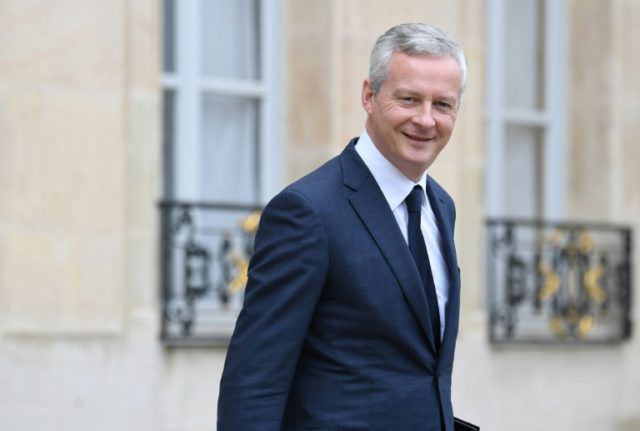Paris (AFP) – France and Germany are close to reaching an agreement on harmonising their corporate tax systems, French Economy Minister Bruno Le Maire said Monday.
Le Maire’s comments, a day after he announced “significant progress” towards a compromise on wider eurozone reforms, are a tentative step forward for French President Emmanuel Macron in his quest to get German backing for an EU shake-up.
“If we get there, it will be a real gamechanger,” Le Maire said of the tax plan.
“Thanks to the tireless work of my team and by the German treasury, I think we are close… to it coming together,” he told a meeting of business leaders’ group Ethic.
Macron is pushing for deep reforms of the EU to bring its nations closer together, and has called for the bloc to harmonise corporate taxes as part of his vision for Europe unveiled last September.
The idea for a Common Consolidated Corporate Tax Base (CCCTB) — a single set of rules for how multi-national companies calculate their taxes — is seen as a first step towards this.
It is also regarded as a means of fighting against tax dodging in which companies move money around Europe to take advantage of low-tax regimes in countries like the Netherlands, Ireland or Luxembourg.
The idea was first mooted in 2011 and relaunched by the European Commission in 2016.
France and Germany initially aimed to come to a common position by late 2017 in order to move the issue forward at the EU level, but have been hamstrung by disagreements.
German Chancellor Angela Merkel said in March that a common tax system would help both countries shore up their competitiveness in the face of a potential trade war unleashed by US President Donald Trump.
Le Maire said Monday that a tax deal would be “a major step forward”, giving businesses more flexibility in knowing the rules were the same throughout Europe.
He holed up for nearly 14 hours this weekend at a Paris hotel with his German opposite number Olaf Scholz to thrash out a compromise on eurozone reforms.
Macron sees Merkel’s support as crucial to carrying out his ambitious EU reform agenda.
But some European states have baulked at some of his ideas for closer integration, including a hefty eurozone budget, and Merkel has been much more reticent than Macron would like.
On Sunday she said she was more open to his plans on migration and defence policy than to his eurozone plans.
“I’m not saying that none of the things he wants will happen,” she told ARD television.
But Macron has plans for the eurozone “that he knows are not the right ones as far as I’m concerned,” she added, singling out as over-ambitious his hope for a budget of one or two percent of eurozone gross domestic product.

COMMENTS
Please let us know if you're having issues with commenting.